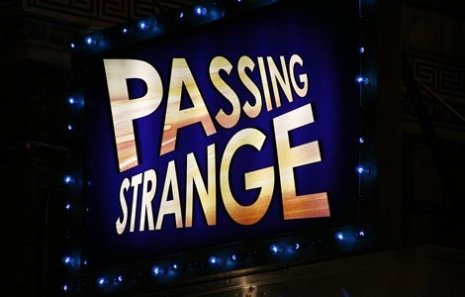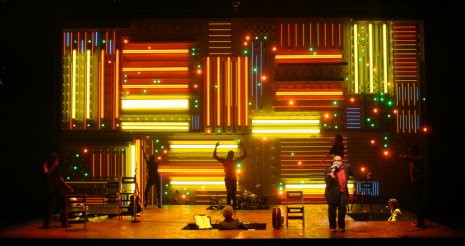Curator and dramaturg Gideon Lester* conducted the following interview with Annie Dorsen via email during the month of March 2014.
Gideon Lester:
Let’s start by talking a bit about your trajectory. Your current work is often highly conceptual, and your most recent productions are experiments and investigations, but you come from a more traditional background. Your breakthrough moment, if you don’t mind my calling it that, came when you directed Passing Strange, a rock musical by Stew and Heidi Rodewald, which was developed by Berkeley Rep and the New York Public Theater before going to Broadway. Could you tell us first a little about your journey to Passing Strange? How did you come to be working on something so mainstream, which now looks relatively anomalous in your career?
Annie Dorsen:
I was always on a double track. I went to Yale School of Drama, spent two summers at Williamstown Theater Festival, and so on. But, at the same time, starting in about 1998, I was also traveling a lot in Europe, and cobbling together my own custom-designed secondary training, or anti-training. You could say that I was building up a traditional American directing career at the same time that I was dismantling it. That's the position I was in when I started Passing Strange with Stew and Heidi. That was 2004. I got a call from a friend at the Public who had recommended me to work with them on some kind of cabaret-type piece. I wasn't interested in cabaret, so when Stew and I talked, I suggested that we start from nothing, without expectations of form or eventual venue, and see where it led. We had no idea it was going to be any kind of mainstream success. We thought at first we were making an experimental music-theater piece. I remember many conversations among the three of us about where we might self-produce the piece when the Public, (inevitably, in our minds) decided to pass on it. But the material was catchy, and Oskar Eustis had just started at the Public and inherited the project from George Wolfe, and went for it full on.
Over the four years of its development - from an empty page to Broadway - we really faced not only our own (sometimes conflicting) artistic ambitions for the piece, but also the piece's changing relationship to the market, and the aesthetic assumptions and expectations that pertained to the different contexts we moved through. That's a slightly abstracted way of saying that, along the way, a lot of kinks got ironed out, a lot of ambiguities got explained, and a lot of interesting possibilities got foreclosed. In some ways it's a pity, though of course I can't say I'm disappointed with how it all turned out! I'm very grateful for my time in the bright lights - it was an extraordinary amount of learning in a short time, and it satisfied some curiosity I'd had about what that situation would be like. Going through it at a relatively young age freed me up to pursue more...let's say, sustaining artistic goals. I should also say that I loved the scale and complexity of the machine up there - that's really fun, to steer a big ship, to manage a lot of divergent interests and perspectives and keep the thing on track. I got to work with Questlove last year on a concert at BAM and we had a very short put-in time in the theater, and I got that feeling again of working fast, efficient, direct, on many many levels at once. It's a joy.
GL:
Presumably after the success of Passing Strange you found yourself at a kind of crossroads. You could have used that success to build a career in the commercial theater, but you moved in a very different direction. Could you talk a little about that decision?
AD:
It's exactly right what you say. After Passing Strange I had a lot of offers to continue on Broadway on large-scale commercial things. But it wasn't at all tempting. First, I had been spending more and more time in Europe and developing very strong personal and professional relationships there - so socially, emotionally, intellectually, I didn't want to tie myself down in New York. And I felt time was speeding along. I'd just spent four years on a single project and I saw how it would be possible, easy even, to spend my whole life moving from one thing to the next, always adjusting myself to structures I didn't believe in, never building my own body of work, leaving so many things undone. The Broadway money was really useful, it relieved so much stress and also gave me a feeling of responsibility that I should put that money to some good use, and let it liberate me artistically.
In other words it didn't really feel like a decision, though, of course, it was one, almost a caricature of a choice between art and commerce. But it was clear to me that's what I would do from about halfway through the Passing Strange process. I knew it was my last mainstream project. A lot of people thought I was insane, though, interestingly, the commercial producer Liz McAnn got it totally. She was maybe the only one who immediately said, "you are doing absolutely the right thing." Well, Liz and my mother, who was so proud of Passing Strange but also felt it was obvious, that of course I should go to Europe and get started with the real work. And as we know, mothers are always right!




